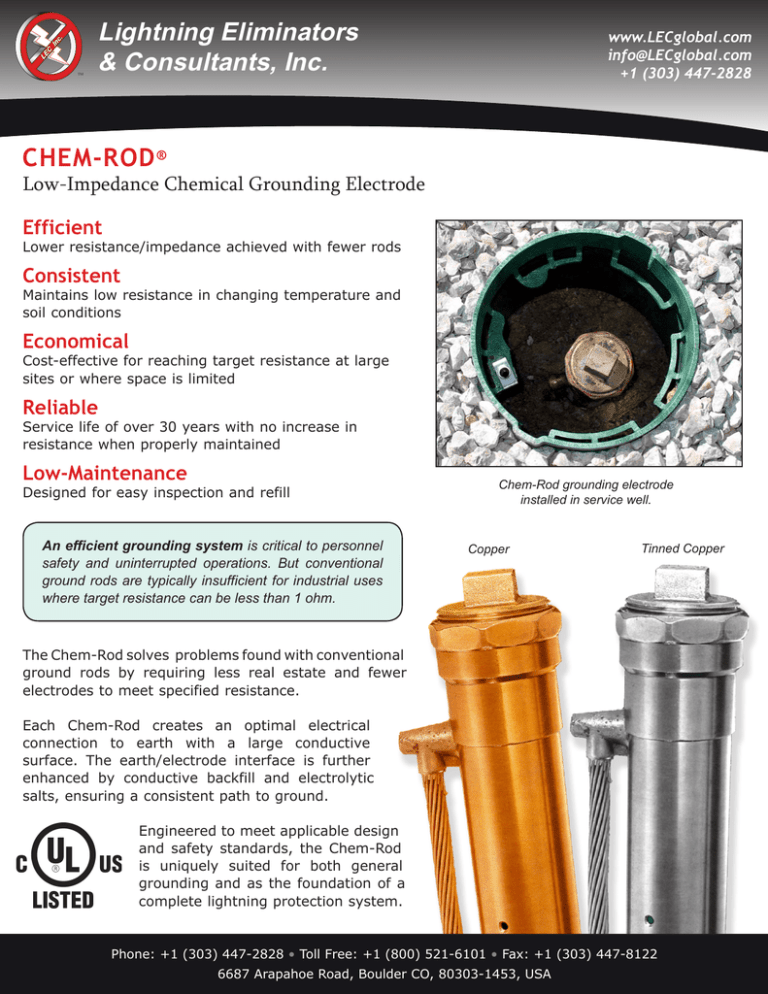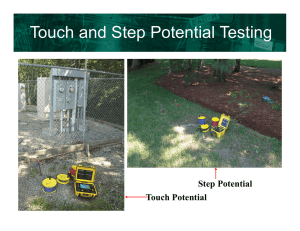Chem-Rod: Low-Impedance Chemical Grounding Electrode
advertisement

TM Lightning Eliminators & Consultants, Inc. www.LECglobal.com info@LECglobal.com +1 (303) 447-2828 CHEM-ROD ® Low-Impedance Chemical Grounding Electrode Efficient Lower resistance/impedance achieved with fewer rods Consistent Maintains low resistance in changing temperature and soil conditions Economical Cost-effective for reaching target resistance at large sites or where space is limited Reliable Service life of over 30 years with no increase in resistance when properly maintained Low-Maintenance Designed for easy inspection and refill An efficient grounding system is critical to personnel safety and uninterrupted operations. But conventional ground rods are typically insufficient for industrial uses where target resistance can be less than 1 ohm. Chem-Rod grounding electrode installed in service well. Copper Tinned Copper The Chem-Rod solves problems found with conventional ground rods by requiring less real estate and fewer electrodes to meet specified resistance. Each Chem-Rod creates an optimal electrical connection to earth with a large conductive surface. The earth/electrode interface is further enhanced by conductive backfill and electrolytic salts, ensuring a consistent path to ground. Engineered to meet applicable design and safety standards, the Chem-Rod is uniquely suited for both general grounding and as the foundation of a complete lightning protection system. Phone: +1 (303) Phone: 447-2828 +1 (303) • Toll 447-2828 Free: (800) • Toll 521-6101 Free: +1 • Fax: (800) 521-6101 • Fax: +1 (303) 447-8122 +1 (303) 447-8122 6687 Arapahoe Road, Boulder CO, 80303-1453, USA The Chem-Rod Advantage Access well cover The Chem-Rod is an ultra-efficient grounding electrode designed to provide the optimal lowresistance, low-impedance interface with earth. Removable cap Low-Impedance Grounding Pigtail connected to ground grid or down conductor The Chem-Rod uses advanced engineering to achieve a consistent, low-impedance, electrical connection with the earth, even in unfavorable and varying ground conditions (like permafrost). • Large surface area: The wider 25/8 inch diameter provides a larger surface area for a better connection to the earth. Conditioning salts Leach holes • Electrolytic salts: In the presence of moisture, these salts dissolve and seep out of leach holes along the electrode. The salts continually increase the soil’s conductivity, further reducing impedance and resistance. GAF backfill • Soil augmentation: Ground Augmentation Fill (GAF) is a combination of organic soil materials which optimize the conductivity of the soil around the Chem-Rod. Increasing the amount of GAF can decrease the overall system resistance, increasing the system efficiency. Moisture reservoir 2 5/8 inch shaft diameter • Easy refills: Every Chem-Rod comes with a standard removable cap and access cover for easy maintenance of the ground salt charge. • Optimized pigtail: The 2 foot long, 4/0 AWG stranded pigtail is exothermically welded to the body of the Chem-Rod. Designed with Lightning in Mind High-frequency transient events like lightning force current flow to the surface of an object. In these events, electrodes with more surface area have less impedance. A copper Chem-Rod has about four times more surface area than a traditional ground rod. This larger surface area helps create the low-impedance connection required to safely channel highfrequency lightning currents to earth. US Patent #6,515,220 Improved Safety The damage caused by a single lightning strike or stray current can cost millions in equipment losses, downtime, and personnel injury. The Chem-Rod can reduce these risks more effectively than other ground rods by providing the most efficient earth interface. In addition, it meets or exceeds relevant design codes and safety standards for protection of personnel, property, and sensitive equipment. Call +1 (303) 447-2828 to get started with Grounding Consulting Outperforming the Competition Applications The ultra-efficient Chem-Rod has been used to replace as many as 10 conventional rods. (Conversion depends on soil conditions and other factors.) Using Chem-Rods in place of traditional rods often results in lower overall costs and improved protection, especially in areas with limited earth available for grounding. Efficient grounding systems reduce the risk of electrical arcing and fires. The Chem-Rod improves reliability for many applications, including: As grounding standards have evolved to require lower resistance levels, better electrodes are needed. While old methods may have been adequate for grounding to 25 ohms, using the same methods to reach 1 ohm or even 5 ohms can be impractical if not simply impossible. An optimized grounding electrode like the ChemRod can reach lower resistance levels with fewer electrodes than traditional methods, making it a more effective solution. A recent NEGRP study tested 15 different types of grounding electrodes including the horizontal Chem-Rod and vertical Chem-Rod. The test included 8 years of analysis at 5 US sites with results verifying that the Chem-Rod consistently provided the lowest resistance of all models tested, as shown below: • Lightning protection systems • Prevention of accidents caused by static charge and stray currents • Protection of central communications, electronics, and AC power systems • Meeting grounding safety requirements for electrical substations • Ground fault neutralization • Safeguarding critical instrumentation and process control equipment Industries • Petrochemical, LNG, and nuclear facilities • Data centers, telecoms, and broadcasters • Process control and automation • Corrections, hospitals, and 911 centers • Government, military, and defense installations • T&D operations, substations, and wind turbines NEGRP Study Results Electrode Resistance in Ohms Soil Resistivity (ohm/cm) Standard ground rod 5/8” x 8’ Las Vegas, Nevada 8,579 85.0 Northbrook, Illinois 2,647 Dallas, Texas Site Location, USA CR-10 in 10’ hole with GAF CR-10H in 9’ trench with GAF N/A 7.3 19.0 2.9 2,739 4.7 2.3 2.0 Poughkeepsie, New York 22,407 137.3 33.8 Staunton, Virginia 11,701 33.9 24.8 15.4 4.3 18.6 Bold numbers indicate lowest reading of all electrodes. CR-10 = 10’ vertical Chem-Rod; CR-10H = 10’ horizontal Chem-Rod National Electrical Grounding Research Project (NEGRP) was managed and sponsored by the National Fire Protection Association (NFPA) Research Foundation Use the Chem-Rod Savings Calculator at www.LECglobal.com TM www.LECglobal.com info@LECglobal.com +1 (303) 447-2828 Lightning Eliminators & Consultants, Inc. Installation The Chem-Rod achieves superior results wherever it can be buried in the earth: indoors or outdoors, in sandy soil or permafrost, even in or beneath concrete slabs. The vertical Chem-Rod is installed in an augured hole. Where augering deep holes is impractical, such as in rocky soil, the horizontal configuration is installed in a shallow trench. Both configurations come filled with electrolytic salts and, as a final step, are backfilled with a mixture of GAF and native soil to achieve the maximum electrical connection to earth. Length Configuration Materials Well Cover Pigtail Horizontal and vertical models in standard 8’ and 10’ lengths Standard Variations 8’ and 10’ UL listed Custom lengths (non UL listed) Vertical or horizontal Custom shapes Copper (type L) Tinned copper (for cathodic protection systems) High-density polyethelyne Steel (H-20 Traffic Rated) 2’ 4/0 AWG stranded wire Custom connections/pigtails Consulting & Technical Support We are a full-service firm aligned to solve your most complex challenges in grounding, surge suppression, and lightning protection. Our integrated approach weighs all of the factors affecting your exposure to lightning and ensures the resulting solution brings the risks within your acceptable range. Our services include: • • • • Risk assessment Advanced and traditional ground resistance testing System design and specification Expert consulting, engineering, and support Call us today at +1 (303) 447-2828 to learn how our solutions can maximize your operation’s potential. © Copyright LEC, Inc. 2008 • Rev 02/08 Visit www.LECglobal.com for warranty details and to view the most current version of this document.

